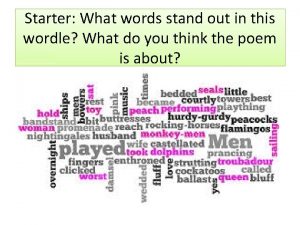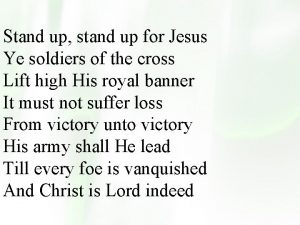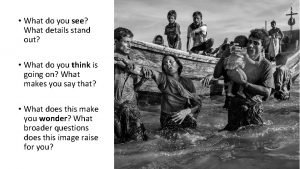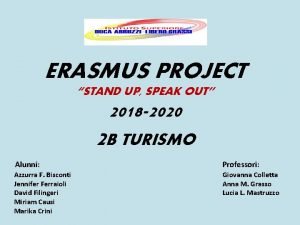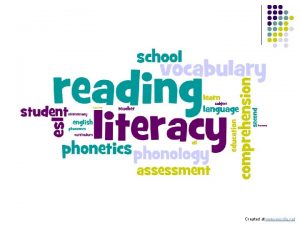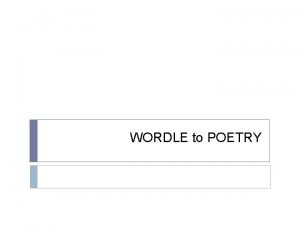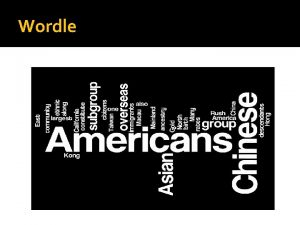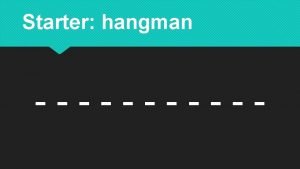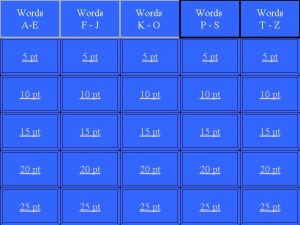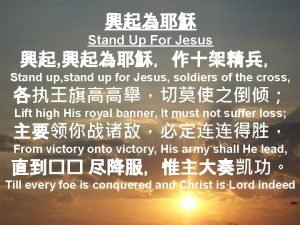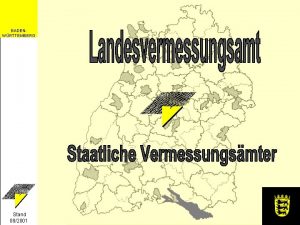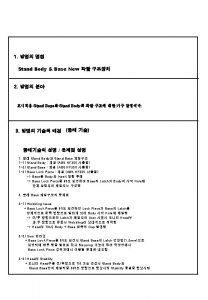Starter What words stand out in this wordle












- Slides: 12

Starter: What words stand out in this wordle? What do you think the poem is about?

Les Grands Seigneurs* – Dorothy Molloy * The Great Lords; it can also, in the plural, mean war lords. Task 1: Read the Poem Objectives: • I Must analyse for key techniques and elements of • What are you first strcuture impressions on meaning? • I should evaluate the use of language. • What language or structural ideas Key Words: have you found? • Courtly • Parenthesis • What’s the • Semantic field message? • Possessive pronouns • Allusions • Passive voice • Active voice

How are men presented in the first three stanzas? • Copy the table and then find images which present men as protective, entertaining or silly in the first three stanzas. Challenge: • Why do you think the narrator describes the men using metaphors like ‘peacocks’ and ‘dolphins instead of personal details? Protective/ Entertaining Silly or Dependable and Absurd Romantic ‘Buttresses’

The Voice? • It is written in the first person from the perspective of a married lady. • Find the possessive pronouns in the first two stanzas. • What does the use of these words suggest to the reader about her belief in herself? • Do these feelings change by the third stanza? What has happened? • Why do you think Molloy has used parentheses (brackets) in the final stanza? What does this signify?

Courtly imagery • Pick out three courtly love images from the poem. • Why has the poet chosen to use this imagery? Historical Context: • Courtly love developed from the Medieval French troubadour poets. • They were often associated with illicit romantic love. • In the courtly love tradition, men did brave deeds to win their lover’s affection. It was common for a married lady to give gifts to a knight before tournaments. • Marriage on the other hand was not about romance or love

Allusions – inter-texuality • She makes allusions to other texts: • ‘Little woman’ – like the novel Little Women by Louisa May Alcott • ‘the best and worst of times’ – This line has been directly taken from A tale of Two Cities by Charles Dickens • Why do you think that she has done this?

MOLSRAP • • Metaphors Onomatopoeia List of three Similes Repetition Alliteration Personification • What examples can you find in the poem?

MOLSRAP • Metaphors – ‘men were by buttresses’, ‘I was their queen’ • Onomatopoeia – ‘hurdy-gurdy’, ‘fluff’, ‘clicked’ • List of three – ‘buttresses, castellated towers, the bowers’, ‘troubadour, the damsel and the peach’. • Similes – none in this poem • Repetition – ‘Men…Men’, ‘My… my’, ‘I …I’ • Alliteration – ‘prancing down the promenade’ it’s plosive • Personification – (reverse) she becomes unhuman ‘I became a toy, a plaything…’

Stanza One Were = past tense bowers = a lady’s private room Buttress = support built on the outside of a wall to make them stronger Turrets and battlements like a castle Men were my buttresses, my castellated towers, the bowers where I took my rest. The best and worst of times were men: the peacocks and the cockatoos, the nightingales, the strutting pink flamingos. Here the first line suggests that the woman speaker feels safe and protected by men – this could refer to fatherly protection shown by men when she was younger. The second sentence alludes to A Tale of Two Cities. The poet is using metaphors to tell the reader about her opinions of men. Metaphors that compare men to birds are used to show the different types of men the narrator recognises. See what types there are. This shows men to be decorative items.

Stanza Two A ballast is something used to weigh down a ship so that it doesn’t topple over and capsize. Again, metaphors are used to show that men are seen as entertainment and a form of pleasure. The personal pronoun ‘my’ in the last line here suggests that the narrator is in control of these men. Men were my dolphins, my performing seals; my sailing-ships, the ballast in my hold. They were the rocking-horses prancing down the promenade, the bandstand where the music played. My hurdy-gurdy monkey-men. The alliteration of the ‘p’ and the catchy rhythm of ‘hurdy-gurdy men’ makes the men seem ridiculous A hurdy-gurdy is a music barrel

Stanza Three This stanza sums up the narrator’s position – ‘I was their queen’. She is treated with respect and adored. Courtly love was a medieval tradition were men admired women: they would write love poems and songs in her honour and acted like a slave towards the woman. The whole point was that the man never got the woman. I was their queen. I sat enthroned before them, out of reach. We played at courtly love: the troubadour, the damsel and the peach. A damsel is a woman (old fashioned word) A troubadour is a poet who wrote about courtly love ‘Peach’ here means the best of its kind although it has also been used in the past to describe the female genitals!

Stanza Four The use of brackets serves to highlight her surprise with the sudden change as though the reader is listening to her complain The whole tone of the poem changes abruptly here – as soon as she is ‘wedded, bedded’ (internal rhyme) everything changes and she becomes reduced to demeaning roles (roles that show she isn’t respected). But after I was wedded, bedded, I became (yes, overnight) a toy, a plaything, little woman, wife, a bit of fluff. My husband clicked his fingers, called my bluff. The speaker shows how insignificant a woman becomes when she is a ‘wife’ by mixing the Now that we have read the word in with ‘bit of fluff’ and ‘toy’. poem the title becomes ironic/sarcastic – men in the narrator’s opinion are not ‘great lords’
